Oct 29, 2018
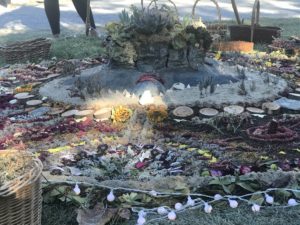 By: Nicole Newell, Sustainable Landscaping Program Manager
By: Nicole Newell, Sustainable Landscaping Program Manager
Permaculture enthusiasts from all over the country and beyond gathered at the Solar Living Institute to attend three days of workshops, keynote speakers, panels, skill shares, ceremonies and so much more. This was a gathering of authentic people genuinely working at creating a world that works for everyone. I walked away from the convergence inspired by the community initiatives. Here are a few that stood out:
Ann Kreilkamp, the founder of Green Acres Permaculture Village, spoke about this intergenerational, intentional community. Located in a suburban neighborhood in Indiana, it includes three adjacent homes, permaculture gardens, pathways and common areas (two greenhouses, a workshop space and a chicken house). A small CSA has evolved from the garden and every Thursday, a meal is shared. Ann aims to transform the paradigm from a culture of complaint into a culture of creativity. She gave an example of a “mistake” made in the placement of a structure. A cob wall and pizza oven was built in a location that resulted in a neighbor complaint to city officials. Ann was angry at the neighbor yet had the wisdom and self-reflection to pause before acting. The residents at the village recognized that this structure was placed on the edge of the property and saw the flaw in the design. They decided that instead of fighting the complaint that they would break down the wall through a “Ceremony of Impermanence” and have a community potluck. More time was spent looking for solutions in a group as opposed to brooding on the problem.
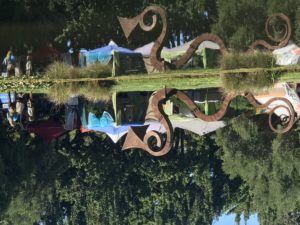 A network of changemakers is growing through NorCal Resilience. This organization was founded in 2013 by Susan Silber and is committed to building resilience in our communities. The Resilient Hubs initiative is a new project aimed at creating neighborhood centers that demonstrate ecological features, prepare for disasters and engage the community. Jessica Bates owns Rising Spring Farm, a private home in the El Sobrante hills that is a growing example of this model. This urban farm displays many elements of permaculture design (swales, berms, perennial vegetables, composting and greywater use).
A network of changemakers is growing through NorCal Resilience. This organization was founded in 2013 by Susan Silber and is committed to building resilience in our communities. The Resilient Hubs initiative is a new project aimed at creating neighborhood centers that demonstrate ecological features, prepare for disasters and engage the community. Jessica Bates owns Rising Spring Farm, a private home in the El Sobrante hills that is a growing example of this model. This urban farm displays many elements of permaculture design (swales, berms, perennial vegetables, composting and greywater use).
While working in her front garden, Jessica naturally began to talk to inquisitive neighbors and a connected community started to emerge. Now a group of 12 neighbors shares a tool library and hosts work parties, crop swaps, and monthly neighborhood gatherings. They even purchase bulk food together. During one meeting they made a sign to place in the front window in the event of a disaster; one side it said OK, the other side said Need Help. It was a simple way to prepare for unexpected challenges during the times we live in.
How do we begin creating a site like this within our own communities? Community hubs are based on relationships. Here are a few suggestions:
- Go to where people already are. Work with existing networks within the community and begin to partner through shared goals.
- Show up to events and share what you have to offer. What are the needs and assets of each person, organization? How do we begin matching the needs of one person/organization and the assets of another?
There was synergy at the Permaculture Convergence. I was inspired seeing so many people and organizations partnering on projects, trying new initiatives, making mistakes, learning and actively working at building community.
Oct 1, 2018
By Marlen Otten, Board Secretary, Sustainable Solano
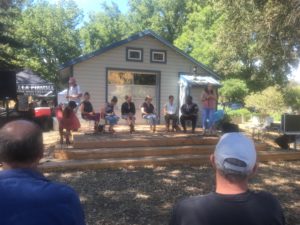 A new movement is emerging throughout the Bay Area where women are connecting to collaborate and embrace their visions for a sustainable and regenerative future for all. Conversations arise about the concepts of abundance, sustainability and what it means to be “regenerative”.
A new movement is emerging throughout the Bay Area where women are connecting to collaborate and embrace their visions for a sustainable and regenerative future for all. Conversations arise about the concepts of abundance, sustainability and what it means to be “regenerative”.
To explore these concepts more deeply, Alexis Koefoed of Soul Food Farm had envisioned for a long time to host a special event at her Soul Food Farm on the outskirts of Vacaville. On Saturday, September 22, 2018, this vision became a reality when women and men gathered at her farm for the first-ever “Women of Abundance: Women Entrepreneurs in the Regenerative Culture, Economy, and Community” event.
The key theme of this gathering was the exploration of the meaning of “regenerative”. It was proposed that “regenerative” is defined as a “living, evolving and naturally functioning environment where abundance and resilience are recurring outcomes of its underlying health”. This idea is closely linked to wide-ranging economic factors throughout our communities in Solano County and the Bay Area. To create regenerative local economies, awareness and education help strengthen the relationship with local food producers and consumers towards an ecologically balanced system. “Regeneration” is also the central theme of the work at Sustainable Solano. Our interest in and commitment to regeneration is at the heart of what we do as we continue to work on our vision for an environmentally and economically sustainable and socially just local food system in our county.
At this unique gathering, a panel of six successful Bay Area women entrepreneurs and farmers was led in discussion by Erin Walkenshaw, who is part of a new movement of spirited women in the Bay Area who are breaking new ground in the world of farming. The panel included Kelly D. Carlisle of Acta Non Verba: Youth Urban Farm Project, in Oakland, Elisabeth Prueitt, co-founder of Tartine Bakery in San Francisco, Nicolette Hahn Niman of Niman Ranch in Bolinas, Rebecca Burgess, Executive Director of Fibershed and Chair of the Board for Carbon Cycle Institute, Helena Sylvester, co-owner and lady farmer at Happy Acre Farm and Jessica Prentice, co-founder of Three Stone Hearth, the nation’s first Community Supported kitchen.
The panel of women leaders shared in one word about the stage where they are at currently, which ranged from transitioning to transformation, surrendering and doing less, highlighting how there is an ebb and flow in life while maintaining a sense of abundance. The participants explored their individual meaning of abundance and their vision for a regenerative agriculture – how to build and shape the traits that give women the strength and empowerment to lift themselves up to continue their work.
The panelists also revealed lessons women can use to reaffirm the support they have historically shared with one another to become successful and what they would do when things get tough, including the need to be in communication with each other. They examined the abundance model versus the competition model, the role of money and power as well as the meaning of equality versus fairness, or the lack thereof, in today’s society. All agreed the need for policies that would support healthy soils as part of a healthy ecology.
This conversation about regeneration and abundance was topped off with culinary delights by local Solano County producers. Attendees we able to explore the goodness of local olive oil and farm eggs, honey by Pleasants Valley Honey Co., fragrant lavender products by Girl on the Hill and they were able to enjoy local oven-baked pizza by Bella Fiamma and local organic cream by Documentary and portrait photographer Paige Green of Petaluma shared her inspiring exhibition of panelist portraits under the big olive tree, where attendees shared inspiring paper notes with their interpretation of the meaning of abundance.
We are grateful for Alexis Koefoed’s vision and taking the initiative to make this inspiring event happen. Events like this bring together the hearts and minds within the community and empower participants to take part in the creation of a sustainable and regenerative future we strive for, and we look forward to the next event.
Feb 10, 2018
SUISUN CITY — If you live in Suisun City and want to turn your yard into a thriving, edible ecosystem, Sustainable Solano would like to hear from you.
The grassroots local nonprofit that started in Benicia is expanding its work to Suisun City and is looking for homeowners interested in creating demonstration “seed plot” food forests in their backyards.
Sustainable Solano will be taking applications through March 16 and will visit each applicant’s site before making a selection sometime in late March.
What is called a permaculture food forest would include using rainwater and gray water from the laundry, a drip irrigation system and sheet mulch. The plants would include fruit trees, berries and plants that are beneficial to insects.
Both the owner and a cadre of volunteers would spend four weekends putting in the food forest whose layout would be cooperatively designed by the homeowner and Sustainable Solano.
The goal is to create between an 1,800- and 2,000-square-foot “oasis of productivity and beauty to nourish you and inspire others,” according to the application that’s available online.
In return for Sustainable Solano helping set up the food forest, the homeowners would be expected to make a five-year commitment to take care of it and open it to the public twice a year as part of an annual garden tour.
“You definitely have to have a green thumb,” Sustainable Solano Executive Director Elena Karoulina said.
Sustainable Solano started in 2016 when supporters of Benicia Community Gardens changed the name as part of its goal to inspire and help the rest of the county to locally grow, regionally source, cook and enjoy healthy food.
The group set up two private gardens and a public one in Vallejo in 2017 and more recently started gardens in Fairfield at Mission Solano, Suisun Valley Elementary School and a private home. They are now looking for one public and one private location in Suisun City and plan to start a similar effort in Vacaville and Dixon later this year.
The group hosted a forum Saturday with author and permaculture expert Denise Rushing and plans a sustainable landscape class at 6 p.m. Thursday at The Salvation Army’s Kroc Center at 586 E. Wigeon Way.
For more information and the application, go to www.SustainableSolano.org.
Feb 1, 2018
By Elena Karoulina, Executive Director, Sustainable Solano
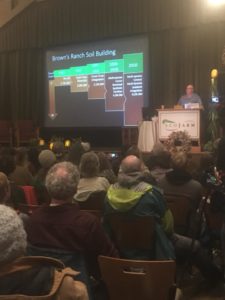 At the end of January, I was honored to attend the 38th Eco Farm Conference at Asilomar Conference Grounds. It’s an annual convergence of farmers, supporting people and organizations dedicated to “ecological farming” – farming that works in harmony with nature, that seeks to heal and regenerate our land and water, and to provide wholesome, nurturing food to our communities. Sustainable Solano is beginning to work toward the vision of a healthy and whole local food system in the county, and we welcome this opportunity to learn from the field and bring this knowledge back to Solano County.
At the end of January, I was honored to attend the 38th Eco Farm Conference at Asilomar Conference Grounds. It’s an annual convergence of farmers, supporting people and organizations dedicated to “ecological farming” – farming that works in harmony with nature, that seeks to heal and regenerate our land and water, and to provide wholesome, nurturing food to our communities. Sustainable Solano is beginning to work toward the vision of a healthy and whole local food system in the county, and we welcome this opportunity to learn from the field and bring this knowledge back to Solano County.
Farm as a living organism, in harmony with nature and people, regenerating its own vitality and fertility on site
The central pole of the conference was sustainable agriculture – why, and most importantly, how. “Regenerating Our Soils” keynote opened the event, followed by many workshops on soil health and building soil fertility directly on the farm and not from the outside in the form of fertilizers, pesticides and herbicides. Healthy soil is the foundation of sustainable agriculture. Cover crop and crop rotation, incorporating animals into farming operations (manure has been the foundation of land’s fertility since humanity began farming 12,000 years ago), no-till approach, composting – all this and more was presented by experienced farmers and scientist now proving in their labs what has been known around the globe for centuries. This attention to soil health is reinforced by our recent realization that improving soil health can reduce greenhouse gas emission and sequester carbon!
Farming workshops included a wide range of topics on plants nutrition, selection, health and diseases; classes on specific crops, irrigation, tools and machinery, greenhouses, seeds and seed saving. Permaculture and biodynamic agriculture were examined through numerous workshops and gatherings. Urban agriculture was included too – an inspiring example from our neighbors in Richmond, Urban Tilth.
“People in communities like Richmond are treated only as consumers, meant to consume the products that others create to help them realize their dreams, and help us continue with our grind. They give just enough to continue, but no more.” Keynote speaker Doria Robinson, Urban Tilth, Richmond, CA.
The next big topic was how to get this wonderful harvest to local communities. Almost a dozen of workshops dedicated to delivery and logistics solutions, Community Supported Agriculture, small independent retails stores and food co-ops, working with restaurants, food safety, and utilizing social media.
And then came everything that surrounds farming: land use, social justice, legal and financial constraints and considerations, farmland protection and farmers’ succession, and food policies – from a Farm Bill to state policies to local laws and ordinances, including zoning. One of the big takeaways for me was the notion of how quickly we are loosing farmland to development, land hoarding and speculation. Representatives from the Sustainable Economies Law Center (our partners in the development of Solano Local Food System!), California FarmLink, California Center for Cooperative Development, various land trusts and legal firms discussed options for farmland protections and creative funding to remove farmland from speculative real estate market and protect it forever for agriculture. Traditional land trusts, emerging affirmative agricultural easements, community land trusts – these and other legal forms were examined at length.
There is no planet B.
Inspiring key speakers kept all of us attuned to the vital importance of this work and kept things in perspective by returning us to big picture. Winona LaDuke spoke beautifully about sacred land and practices of native people, new economy, environmental justice and a choice between a well-worn, scorched path and a new, green path ahead of us. Dr. John Ikerd masterfully outlined the devastation caused by industrial agriculture and promise of small farms and ecological farming to finally end hunger. John argued that healthy food is a fundamental human right, and since market economy failed our food system, local jurisdictions can declare basic food to be a utility and thus be provided to all people as basic services, just like water or energy.
After these three days of intense learning and networking, going from inspiration to despair and back to resolve to make a difference, we returned home ready to tackle the most important, fundamental and life-giving area of our lives – healthy local food for all.
Made possible by Solano Public Health in partnership with the Yocha Dehe Wintun Nation
Dec 1, 2017
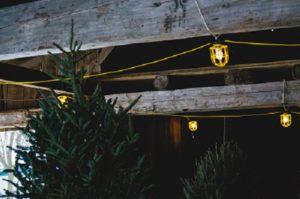
Did you know that during Thanksgiving and New Year’s Eve, household waste increases by 25 percent, adding an additional one million tons of waste per week during this season? And what should you really do with your Christmas tree? When the time comes to face holiday clean-up, keep in mind these Earth-friendly resources and tips for how to dispose of your holiday waste.
Solano County Recycling Guide: Click Here
Earth911.com offers a very handy Recycling Search to search for locations to take your recyclables! Simply type in the item that you are looking to recycle in the search bar and your zip code. Get instant results that indicate which local municipality disposes of this items and how they prefer you dispose of it.
Christmas Trees:
Most cities in Solano County have curbside pick-up on specific dates in early January. Find your town’s dates and give them a call to schedule your pick-up. To prepare your tree for collection, remove all tinsel, ornaments, lights, and stands, including wooden stands. Trees sprayed with artificial snow, unfortunately, cannot be composted and must be placed in your black bin or left curbside to be collected as trash.
Several Boy Scout troops will also be picking up trees this year. Check your local cities’ troop website for individual tree collection schedules.
Holiday Lights:
Check your local hardware store, like Lowe’s or Home Depot who also offer Christmas light recycling for their customers.
Visit Earth911.com to see which recycling center near you in accepting Christmas lights as e-waste this year.
Wrapping Paper:
This may come as a surprise but wrapping paper isn’t entirely just paper and does not go in your recycle bin! Many standard rolls are coated with a thin, glossy plastic coating rendering it unrecyclable. Instead of scooping up crumbled piles of this stuff into your already overflowing garbage bins, consider re-using it for package stuffing to protect your holiday gifts in transit. Click here for 20 Ways to Reuse Gift Wrap.
Christmas Cards:
We all love receiving them but many cards are decorated with sparkly, festive materials like glitter glue, jewels and foam décor making these cards unrecyclable. Here are some alternatives to simply storing your Christmas cards in a shoe box or bin never to see the light of day again or having them end up in the trash:
- Re-use the front of the card! Cut in half, still saving your personalized message if you wish, and simply paste the card front on a blank card for re-use.
- Cut out your favorite images and pieces and attach them to a holiday gift box or wrapped gift for an extra festive touch!
Local Efforts:
Republic Services’ Reuse Round-Up: On Saturday, December 16th from 9am-1pm, drop off your gently used clothing, housewares, bicycles, toys, games, and costume jewelry at Benicia High School, 1101 Military West, (at main steps to office) and help a local charity. Donations will go to “Faith Food Fridays,” a nonprofit serving the less fortunate of Solano County. Please, NO mattresses, large furniture, electronics, stuffed animals, or overly worn items. For more information, contact Marie Knutson at mknutson@republicservices.com or (925) 671-5814.
Nov 1, 2017

Solano County middle and high school students and their teachers are being asked to “Imagine a Day Without Water”- this year’s theme for the 2018 Water Awareness Video Contest, sponsored by the Solano County Water Agency and local water utilities. Participating students and teachers will have the chance to win up to $1,500 in cash by creating an original 60-second Public Service Announcement video on a variety of water efficiency topics, highlighting actions that can be taken each day to use water more wisely.
Solano County teachers who sponsor multiple students will receive an additional incentive of Amazon gift cards.
The contest is open to middle school and high school students in Solano County. Submissions will judged on entertainment value, originality, videography, style and organization, audio/sound, movie content and accuracy. The deadline to enter is Wednesday, April 11, 2018.
For contest rules and entry forms and tips on using water efficiently, visit the video contest page at www.solanosaveswater.org
 By: Nicole Newell, Sustainable Landscaping Program Manager
By: Nicole Newell, Sustainable Landscaping Program Manager A network of changemakers is growing through NorCal Resilience. This organization was founded in 2013 by Susan Silber and is committed to building resilience in our communities. The Resilient Hubs initiative is a new project aimed at creating neighborhood centers that demonstrate ecological features, prepare for disasters and engage the community. Jessica Bates owns Rising Spring Farm, a private home in the El Sobrante hills that is a growing example of this model. This urban farm displays many elements of permaculture design (swales, berms, perennial vegetables, composting and greywater use).
A network of changemakers is growing through NorCal Resilience. This organization was founded in 2013 by Susan Silber and is committed to building resilience in our communities. The Resilient Hubs initiative is a new project aimed at creating neighborhood centers that demonstrate ecological features, prepare for disasters and engage the community. Jessica Bates owns Rising Spring Farm, a private home in the El Sobrante hills that is a growing example of this model. This urban farm displays many elements of permaculture design (swales, berms, perennial vegetables, composting and greywater use).
 A new movement is emerging throughout the Bay Area where women are connecting to collaborate and embrace their visions for a sustainable and regenerative future for all. Conversations arise about the concepts of abundance, sustainability and what it means to be “regenerative”.
A new movement is emerging throughout the Bay Area where women are connecting to collaborate and embrace their visions for a sustainable and regenerative future for all. Conversations arise about the concepts of abundance, sustainability and what it means to be “regenerative”. At the end of January, I was honored to attend the 38th
At the end of January, I was honored to attend the 38th 

